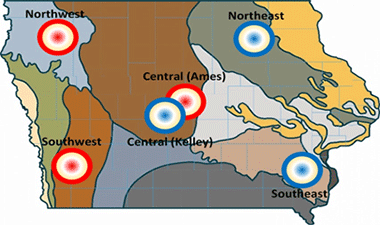By Mark Licht
A web tool was developed by Iowa State University personnel to help farmers make in-season and pre-season crop management decisions based on real-time information and predicted outcomes. The Forecast and Assessment of Cropping sysTemS (FACTS) was recently launched online (crops.extension.iastate.edu/facts), and is a free, publicly available service. The forecasting tool provides detailed information on weather, soil water and nitrogen, crop staging, temperature stress, and yields.
“FACTS will indicate to farmers if soil water or nitrogen are adequate, and how current weather conditions could affect yield potential,” said Mark Licht, extension cropping systems agronomist at Iowa State University. “Ultimately, getting a good indication of yield potential can help farmers make grain marketing decisions prior to harvest.”
Summary information from six locations across Iowa, which includes precipitation, yields, soil nitrogen status, growing degree days (GDD), and crop N, and water uptake, is updated every 10 days. The latest forecast information is available from June 23. The weather forecast is updated every day.

“FACTS provides scientific information during the growing season when it is most needed to help farmers make informed decisions,” said Sotirios Archontoulis, assistant professor of integrated cropping systems at Iowa State University.
In addition to the forecasting tool, an assessment tool will be launched in the fall of 2016. The assessment tool will provide an analysis of the 2016 growing season, including the yield gap and management practices to improve the 2017 planting and growing season.
“As the season comes to a close, a post-season scenario analysis can be done to show what could have been done differently, as far as management is concerned, to achieve better profitability, productivity and environmental goals,” said Licht.
FACTS uses a systems approach and information for forecasts are gathered by: mechanistic cropping systems model (APSIM) that simulate crop growth, soil dynamics and soil-crop-weather interactions including subsurface (tile) drainage; actual, historical and forecasted weather information from NDFD and CFS models; frequent soil, crop and weather ground-truth measurements; and advanced statistical and visualization tools to disseminate the information.
Source:iastate.edu